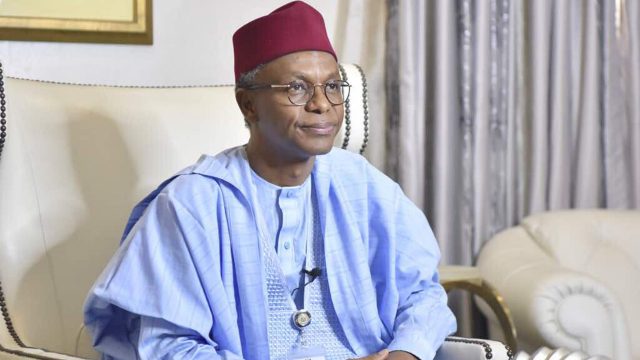By Sunday Onyemaechi Eze
Out of the 48 ministerial nominees sent to the Senate for screening and confirmation by President Bola Ahmed Tinubu, Mallam Nasir el-rufai, the immediate past governor of Kaduna State failed to make the final list. His problem begun when Sunday Karimi, the Senator representing Kogi West Senatorial District waved a petition bothering on security against the former.
At that point it was clear to El-Rufai himself that he was at a cross-road as he sought the leave of Senators to address the issue. However, the Senate President Godswill Akpabio seemed to have saved the situation by emphasising that even if there was a petition against the nominee, it was not within the ambit of the Senate to discuss a petition not before it.
At the end of the close-door-session, the Senate emerged without the name of El-Rufai on the confirmed list. His rejection by the Senate has become a topic of national discourse since then. In fact, the news of his non-confirmation was received with mixed feelings.
El-Rufai’s supporters have risen in defence of their man detailing his stand and support for Tinubu in time of political need. His performance as the former minister of the Federal Capital Territory (FCT) was also an achievement always on the table whenever it matters to El-rufai. They also brandished his sterling performance in infrastructural development especially road construction in Kaduna as major achievements.
These are reasons behind El-Rufai’s botched ministerial confirmation. First, fear of his duplicity and proclivity to manipulate. The original Tinubu loyalists from the days of Alliance for Democracy (AD) would not accommodate the likes of El-Rufai who is seen as a wolf in sheep’s clothing.
Second, strategic positioning for power and permutations ahead of 2027 within the north was said to have worked against El-Rufai. The likes of the Vice President Kashim Shettima, George Akume and Nuhu Ribadu would like to leverage on their positions to consolidate their powers, thus, would not like strong contenders or obstacles to their aspirations.
Stories were rife on how he allegedly betrayed his benefactor – former Vice President Atiku Abubakar who raised him from the ashes of obscurity to political lime light. As the Chairman of the National Council on Privatisation, Atiku appointed him the Director–General of the Bureau of Public Enterprise (BPE) but when succession drama between Olusegun Obasanjo and Atiku brewed, El-Rufai pitched tent with Obasanjo.
At the end, Obasanjo summed up the man El-Rufai thus in his book, My Watch Vol.II, “Nasir’s penchant for reputation savaging is almost pathological. Why does he do it? I recognised his weaknesses; the worst being his inability to be loyal to anybody or any issue consistently for long, but only to El-Rufai. He barefacedly lied which he did to me against his colleagues and so-called friends. ….”. His high handedness is second to none. Nobody says no when El-Rufai has said yes despite how reasonable. To conclude that he is arrogant and wielded authoritarian powers even in democracy is to say the least.
Since 2003 when he became the minister of FCT, El-Rufai has capitalised on taking undue political advantage of situations to enrich his political resume. Before 2023, he was one of the closest allies of Muhammadu Buhari who sources say nursed presidential ambition. In fact, he was a latter day apostle of Tinubu’s candidacy.
The precarious security situation in Kaduna which led to the death of at least 1,266 and kidnap of 4,973 persons in one year according to sources was the last straw that broke the Carmel’s back. His nonchalant attitude to the incessant killings and kidnapping of innocent travelers along Kaduna-Abuja expressway with little or no effort to tame it was an established case of negligence.
Numerous attacks on communities in Southern Kaduna by terrorist groups and bandits known to be of Fulani ethnic nationality and his indifference to their plight was one sour point of his administration. Petitions bothering on human right violations against him were rife. The killing of over 300 Shi’ia members in Zaria in 2015 under his watch has continued to reverberate.
Many court cases challenging demolition notices government served communities, land matters and seized or destroyed properties of individuals are legal issues he had left behind for the new administration in Kaduna to sort out. His penchant for demolishing what he called illegal structures, new communities, schools and rationalisation of the state civil service will continue to bear witness against El-Rufai.
Nothing last forever not even our lives. Mallam Nasir El-Rufai has straddled the political firmament of Nigeria like a colossus for over two decades. Apart from beneficiaries of El-Eufai’s hegemony and those who pick crumbs from his political table, street opinion of good governance if carried today will not favour him.
People take note and often refer to the role one plays to raise or destroy the political fortunes and profile of leaders at one point or the other. Therefore, becoming relevant in a new political dispensation is determined by how people view your take on power, position and authority. How those you vilified or crushed with power at your disposal years ago on account of your influence and position see you today matters.
There is always a payback time. The fate of El-Rufai today is a compensation for his good deeds of yesterday. Being in position of authority is a trust to do good to all without fear or favour. Political power is transient. What goes round comes around. That’s the way the cookie crumbled.
Eze, a Media and Development Communication Specialist wrote via: sunnyeze02@yahoo.com 08060901201

